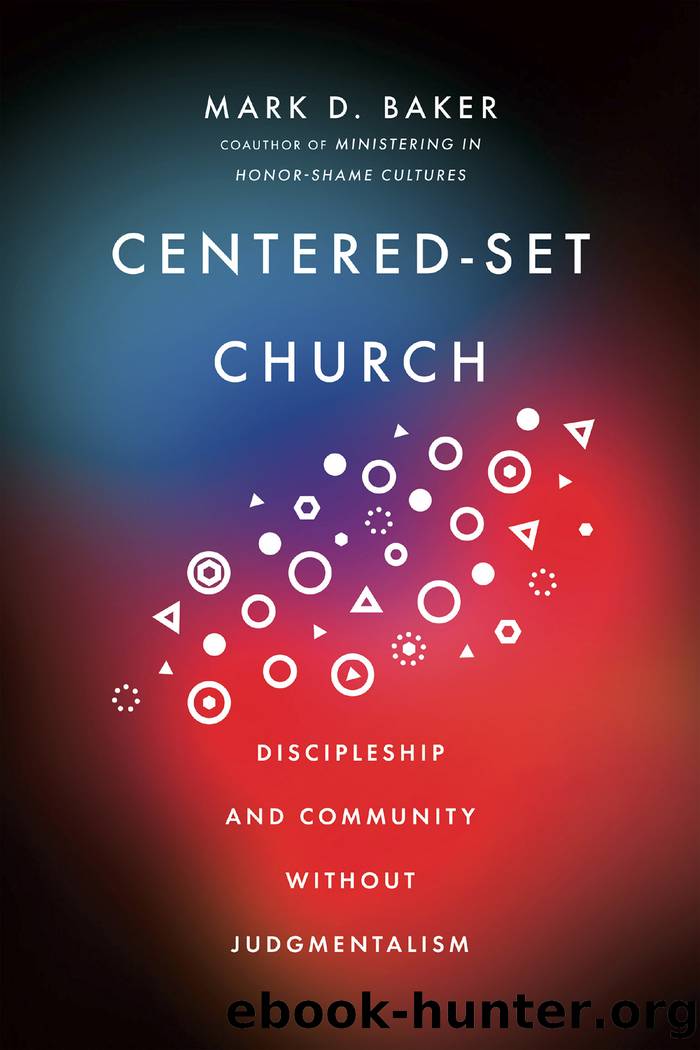Centered-Set Church by Mark D. Baker

Author:Mark D. Baker
Language: eng
Format: epub
Tags: Discipleship;legalism;relativism;moral relativism;legalism in the church;relativism in the church;Christian relativism;Christian mission;Paul Hiebert;bounded set;fuzzy set;centered set;ecclesiology;boundaries;church boundaries;Christian boundaries;evangelism;church community;Christian community;church mission;church vision;parachurch;parachurch ministry;avoid legalism church;Christian resources;church ministry;Christian witness;future of the church;outreach;centrist;conservative;liberal
Publisher: InterVarsity Press
Published: 2021-09-28T08:01:42+00:00
HUMILITY
In response to complaints about churchesâ line-drawing judgmentalism, we might say, âOur church is different. We are not like that.â That may be fully accurate. A centered church is different from a bounded one. Yet for someone deeply wounded by a bounded church, those words of reassurance will not be enoughâand understandably so. Nor will non-Christians turned off by self-righteous judgmentalism be so easily reassuredâand understandably so.19 Those wounded by bounded approaches must hear more than our defensive words. They must experience our love and the qualities mentioned in this chapterâperhaps especially humility. We cannot ignore the importance of humility, particularly when we interact with those who have been wounded or turned off by bounded Christianity. We can lessen their defensive wariness through the humility of confessing and apologizing.
Picture a college ministry setting up a confession booth in the midst of a university festival that is notorious for its drunken behavior and debauchery. What do those passing by imagine? Now envision the surprise of those who actually step into the booth and discover that the Christian in the booth is not judgmentally accusing people, but apologizing for the ways that the church has hurt others and confessing the ways that he has personally failed to live out what he believed. Donald Miller, who was one of the apologizing Christian students in the booth, writes, âMany people wanted to hug when we were done. All of the people who visited the booth were grateful and gracious.â Miller reports changed attitudes among the non-Christians who heard the confessions as well as the confessing Christians.20 When we apologize and confess to others, we communicate that we do not think we are superior, while we also communicate that there are standards by which we are seeking to live.
Craig Detweiler tells a similar story about being at the Sundance Film Festival with his communications students.21 One film, a scathing satire of American evangelicals, drew a standing ovation. Jay Floyd, the filmmaker, had grown up in a bounded church in North Carolina. As a gay man, Floyd clearly felt condemned by the church of his youth. Detweiler recounts, âWhile the filmgoers celebrated this assault on the religious right, I shed a tear, depressed and convicted by the depiction of Christians as judgmental and vindictive.â After the showing, Floyd took questions from the audience. Someone asked if any conservative Christians had seen it. His reply, âIâm ready for that fight,â prompted more applause. Detweiler felt the Spirit moving him to say something. He stayed seated. Soon the moderator said there was time for two more questions, and Detweiler found himself standing up. He recalls,
Download
This site does not store any files on its server. We only index and link to content provided by other sites. Please contact the content providers to delete copyright contents if any and email us, we'll remove relevant links or contents immediately.
Victory over the Darkness by Neil T. Anderson(2850)
The Rape Of Nanking by Iris Chang(2802)
Chosen by God by R. C. Sproul(2148)
Habits of Grace by David Mathis(1970)
Crash the Chatterbox by Steven Furtick(1964)
Knowing God by J.I. Packer(1841)
How To Be Born Again by Billy Graham(1770)
A Prophet with Honor by William C. Martin(1710)
Gospel-Shaped Marriage by Chad van Dixhoorn(1703)
Peace with God by Billy Graham(1671)
Confronting Christianity by Rebecca McLaughlin(1573)
God's Smuggler by Brother Andrew(1533)
Angel Dreams by Virtue Doreen Virtue Melissa(1467)
Whisper by Mark Batterson(1448)
The School of Biblical Evangelism by Ray Comfort(1424)
Missionaries by Norman Lewis(1421)
The Truth War by John MacArthur(1420)
The Poems of Rowan Williams by Rowan Williams(1347)
Do Greater Things by Robby Dawkins(1317)
